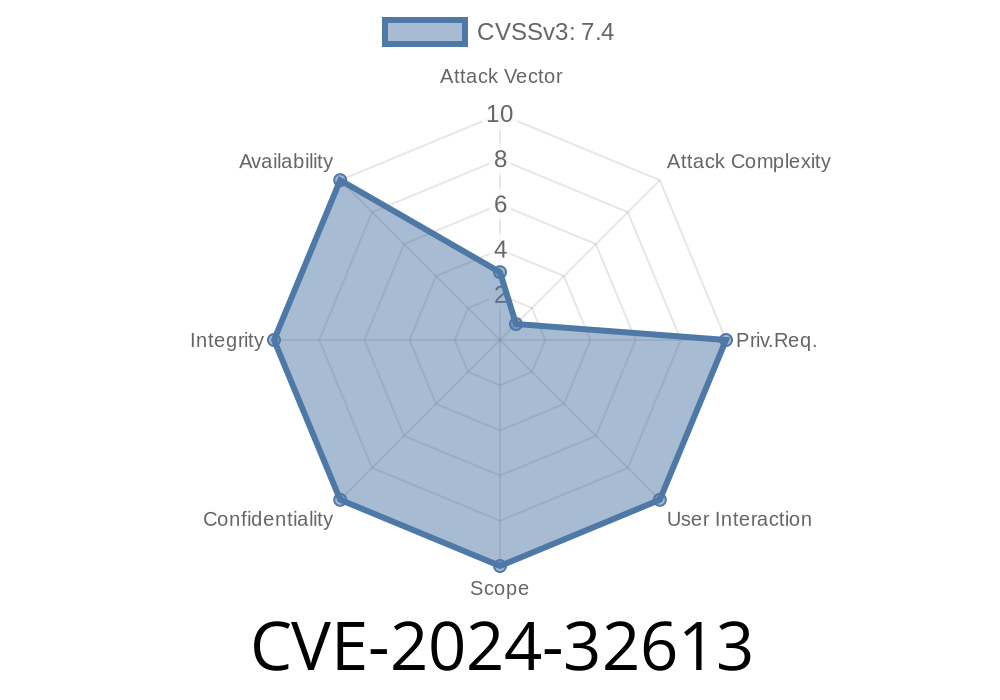A new security vulnerability has come up in the HDF5 Library, affecting all versions through 1.14.3. Labeled CVE-2024-32613, this bug is a heap-based buffer over-read in the H5HL__fl_deserialize function (in the file H5HLcache.c). It's separate from the older CVE-2024-32612, and if you're handling scientific data, simulations, or ML pipelines that use HDF5, this one's for you.
This article breaks down what CVE-2024-32613 is, why it’s dangerous, shows a code example, gives you a basic exploit, and links to the original resources.
What Is HDF5?
HDF5 (Hierarchical Data Format version 5) is a popular file format and library used for big datasets. It’s common in scientific computing, machine learning, and high-performance computing.
What Is CVE-2024-32613?
CVE-2024-32613 is a heap-based buffer over-read—it means the program reads *more* memory than it should. This can cause the program to crash, leak information, or—in some cases—lead to code execution.
It’s located in the internal function H5HL__fl_deserialize in the C file H5HLcache.c. This function is used to deserialize free list structures for local heaps—a common element in HDF5 files.
What’s Different from CVE-2024-32612?
While CVE-2024-32612 affected a different function or code path, this bug is about buffer over-read in a different serialization routine.
> If you patched for CVE-2024-32612, you still need to patch for this!
Here’s a *simplified* snippet of the kind of pattern involved (from the HDF5 source)
herr_t H5HL__fl_deserialize(const uint8_t *image, size_t image_size) {
size_t offset = ;
uint32_t n_free_blocks;
// ... Other vars ...
// Suppose this reads a 4-byte header
if(image_size < 4)
return FAIL;
H5MM_memcpy(&n_free_blocks, image + offset, 4);
offset += 4;
// Suppose each free block info is 8 bytes
for (uint32_t i = ; i < n_free_blocks; i++) {
if (offset + 8 > image_size) // Should check for out-of-bounds
return FAIL; // <-- The real bug: check is insufficient or missing
// ... read next 8 bytes ...
offset += 8;
}
// ...
}
The Issue
The routine reads metadata for a number of "free blocks," but a malicious file could set n_free_blocks very large, without the buffer being big enough to hold them. If the code does not do proper boundary checking inside the loop, it reads outside image — that’s a heap buffer over-read.
Information Leakage: Over-reading may dump out heap fragments, potentially leaking secrets.
- Possible Code Execution: Less likely, but exploitable heap reads can sometimes let attackers steer the program into arbitrary behavior.
Simple Proof-of-Concept (PoC) Steps
Suppose you have a program that uses an out-of-date HDF5 library and reads a file supplied by the attacker.
PoC in Python (to generate a malicious image)
# Generate a malicious HDF5 'heap' segment with n_free_blocks set high
with open("malicious_heap.bin", "wb") as f:
n_free_blocks = (xFFFFFFF).to_bytes(4, 'little')
# No actual free block data follows
f.write(n_free_blocks)
# Not enough bytes follow, so any loop will over-read
If a vulnerable app opens this as a heap block, it may crash or leak data.
Upgrade HDF5!
- The upstream HDF5 1.14.4 and later have fixed this.
For direct users
- Download the patched version from HDFGroup releases.
The patch adds strict size checks before the loop
if (offset + n_free_blocks * 8 > image_size)
return FAIL;
References
- CVE-2024-32613 Record at NIST NVD
- Upstream HDF5 GitHub PR fixing this (PR #2486)
- HDF5 Official
Conclusion: Who Should Care?
- Researchers and scientists: If you exchange HDF5 files with collaborators, you’re at risk of “accidental” malformed files causing crashes.
Software maintainers: Sync your dependencies.
Bottom line: Patch your HDF5 library. Heap buffer over-read bugs can be subtle but dangerous, even if they don’t sound “severe.”
*Questions or feedback? Drop them below or reach out to the HDF mailing list. Stay safe!*
Timeline
Published on: 05/14/2024 15:36:46 UTC
Last modified on: 07/03/2024 01:56:46 UTC
